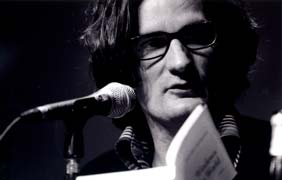
Frédéric Beigbeder
Frédéric Beigbeder was born in Neuilly-sur-Seine, France, in 1965. While studying politics he became involved in the organisation of parties in the Parisian night scene. After the publication of his first novel “Memoires d’un jeune homme dérangé” (1990; t: Memoirs of a Deranged Young Man), he embarked on a career in advertising as a copywriter, and worked successfully with various agencies for ten years. Simultaneously, he made a reputation for himself through his literary reviews for a variety of magazines including “Elle”, “Paris Match”, and “Voici” along with cultural programmes on French TV. Feeling at home in the world of glamour and scandal, the provocative writer soon became the controversial, as well as the admired, enfant terrible of the French literary scene. In 1994, he founded the Prix de Flore for young authors (named after the famous Café de Flore in St.-Germain-des-Prés), whose award winners include Michel Houellebecq and Virginie Despentes.
Beigbeder’s work could be labelled “autofiction”. His alter ego Marc Maronnier, the typical society hedonist of the 1990’s fun and party generation, is portrayed in a narcissistic-ironic way in the trilogy of “Memoires d’un jeune homme dérangé”, “Vacances dans le coma” (1994; t: Holidays in a Coma), and “L’amour dure trois ans” (1997; t: Love Lasts Three Years). In his scandalous novel “99 francs” (2000; Eng. “£9.99”, 2002) Beigbeder casts a gaze over a society based on sham, brand names, and superficialities, thus lampooning the advertising industry. The “world power of advertising” that he warned of, consequently put an abrupt end to his copywriting career. Since then he has supported the activities of the anti-globalisation “Antipub”-movement, and also devised the advertising for the 2002 election campaign of the Communist Party candidate, Robert Hue. His most recent novel has again given rise to international criticism and heated debate. With the title referring to the name of the restaurant at the World Trade Center, the 119 brief chapters of “Windows on the World” (2003) report the last 119 minutes of a real estate agent who is having breakfast there with his two sons on 9/11. In a parallel strand of the story, the narrator, called Frédéric Beigbeder, is sitting in the topfloor restaurant of the Tour Montparnasse in Paris. The time is one year later and he is musing on the effects of the terrorist attack on the western world, on Franco-American relations, and on his own life. In France, the book was widely acclaimed and awarded the Prix Interallié in 2003. His novel “L’égoïste romantique” (2005; t: The romantic egoist) is a polemical portray of the media society and sensationalism in the form of an “anti-journal”.
Frédéic Beigbeder lives in Paris and works as a writer, literary critic and chief editor of the publishing house Flammarion.
© international literature festival berlin
Neununddreissigneunzig
Rowohlt
Reinbek, 2001
Übersetzung: Brigitte Große
Memoiren eines Sohnes aus schlechtem Hause
Rowohlt
Reinbek, 2001
Übersetzung: Brigitte Große
Ferien im Koma
Rowohlt
Reinbek, 2002
Übersetzung: Brigitte Große
Die Liebe währt drei Jahre
Rowohlt
Reinbek, 2003
Übersetzung: Brigitte Große
Letzte Inventur vor dem Ausverkauf. Die 50 besten Bücher des 20.Jahrhunderts.
Rowohlt
Reinbek, 2004
Übersetzung: Juliane Gräbener-Müller
Windows on the World
Ullstein
Berlin/München, 2004
Übersetzung: Brigitte Große
Der romantische Egoist
Ullstein
Berlin, 2006
Übersetzung: Brigitte Große
Au secours Pardon
Grasset
2007
Übersetzer: Juliane Gräbener-Müller, Brigitte Große
